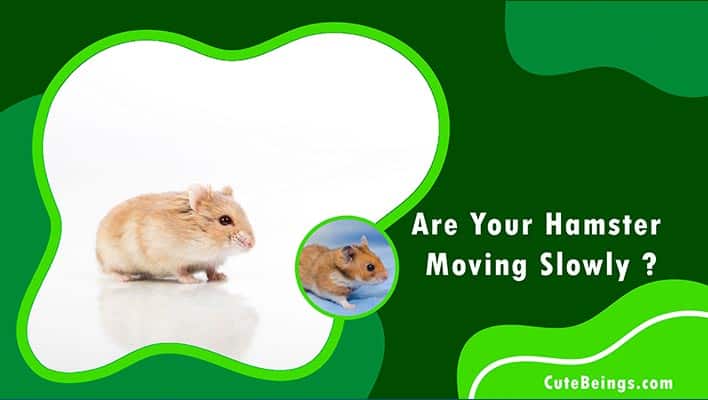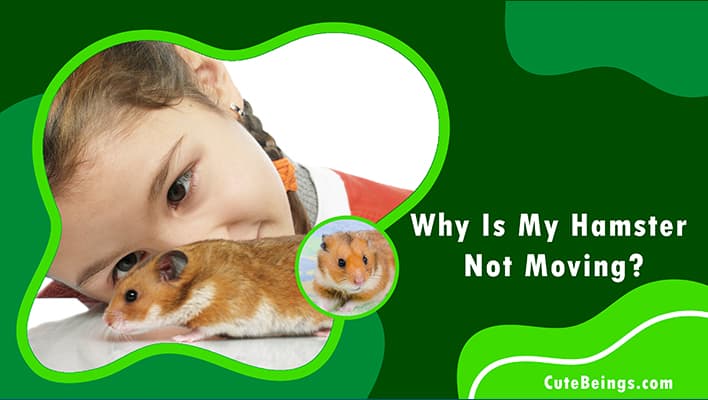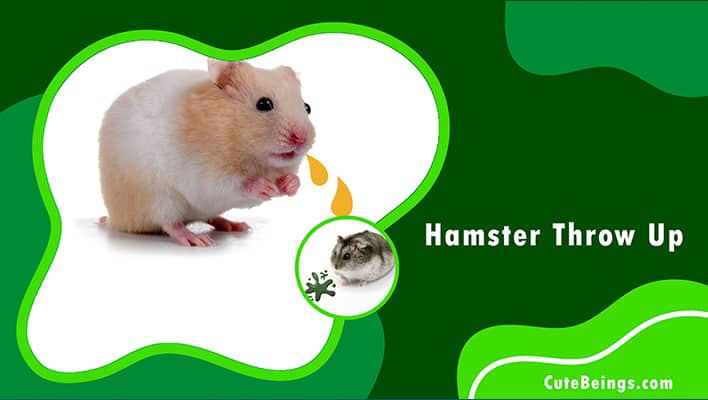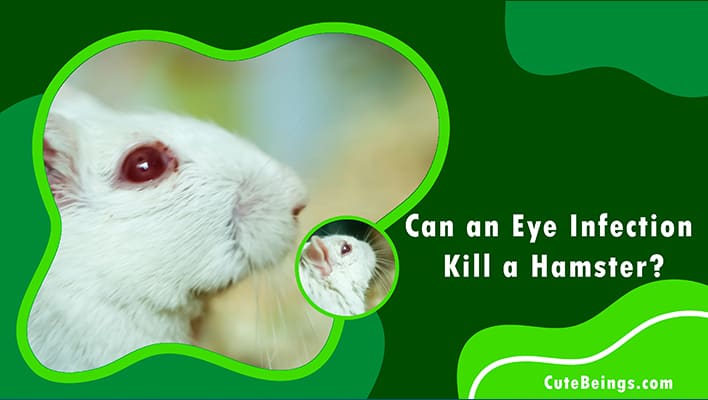The idea of keeping a hamster as a pet is wonderful. There are, however, a few unexpected changes in them that frighten you. Happy and healthy hamsters are so active and cheerful that they spend much of their time going to and fro within the cage, wooden ladder bridges, or the playground territory.
In some cases, hamsters’ sluggish motion should be taken into account. Their little bodies and bones get readily harmed because of small accidents or falls, certain illnesses, brain strokes, breathing problems, or just because of age. Old Hamsters tend to move more slowly because they often trip and fall. Is your hamster moving slowly? We’ll take a look at what could be causing this and how to fix it.
Table of Contents
08 Reasons Why My Hamster Is Walking Slowly
Slips and Falls
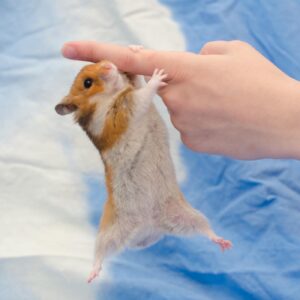
Hamsters slow down because of frequent slips and falls. While running, they might get hurt, which could lead to small cuts and scrapes or something more serious (broken limbs, swelling, bleeding, limping). These accidents may occur due to their behavior or owners’ carelessness.
Assume that you lose control and drop off your pet hamster, what will you do?
Keep in mind that its after-effects will depend on how bad the incident was: the height of the fall, what part of its body was hit, certain responses and reactions, and how often it eats. Also, you should pay careful attention for at least a day to spot any bad signs.
Pick up your hamster if you accidentally drop it and don’t appear surprised. Simply act normally with an extra-caring touch. When hamsters fall, most of them do not scramble away. They ascend and remain in the same place. Hamsters are always sensitive and indicative, so lookout to see if they’ve been hurt. As long as they land on their feet after an accident or mishap, it’s perfectly fine. If it falls on a sharp item or in an unusual posture, your hamster might cause joint pain or severe injury. In some cases, they may feel awkward right once; in others, it may take a few hours.
It is important to hold tight when in hand or lending it because some hamsters react oddly to strangers. If you fear your little one has been critically hurt in a fall, take it to a veterinarian as soon as possible. Don’t make it suffer.
Brain Strokes
A stroke causes hamsters to become lethargic and exhausted. This means that the hamster is unable to maintain its body balance or feel dizzy while it walks. It can be temporary and self-recovering, or it can be permanent. Rather than walking, they will start to wait and stare at the surroundings exhibiting little enthusiasm for daily chores or without any involvement at all. In such situations, the best option is to take it to a veterinarian as soon as possible.
Neurological illnesses can be difficult to identify and might cause discomfort plus various unexpected behaviors. They begin to run in circles and, in difficult situations, fall over repeatedly. Due to a stroke, hamsters experience trouble with eating, mobility, and mental health; Hence they will require constant care for several weeks.
Scurvy
Scurvy is a terrible condition in hamsters due to inadequate intake of vitamin C (Ascorbic acid). This results in a lack of energy and a drop in weight. Infected hamsters exhibit symptoms such as squealing when touched, loss of fur, and slumped- unstable gait. Thus, Improper medications and care will be fatal.
Vitamin C is essential for your pet’s health since it aids in the formation of hemoglobin and supports both major and minor body functions. Even though it’s usually best to use natural methods of supplementation, if that’s not an option, a vet-recommended dosage of vitamin C tablets can be given.
Providing your hamster with a well-balanced food rich in lettuce, fruits, and veggies not only covers up for any vitamin deficiencies but also keeps it active and healthy throughout the day. Always get advice from a veterinarian to ensure and confirm the presence of pets’ weaknesses. Never attempt it alone.
Health Complications
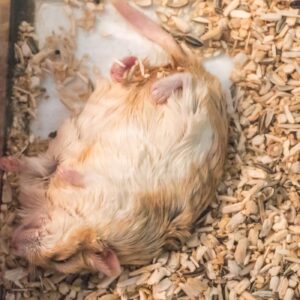
Watch for a while whether it is breathing. Sometimes hamsters slow down due to hibernation. It is not necessarily a sign of injury just because they are moving more slowly. Yet some dreadful diseases like Arthritis and hind leg paralysis can cause severe pain to your hamster making it lethargic and weak. Use a thermometer to check the temperature of the hamster during serious health conditions and illnesses.
In addition, keep a suitable room temperature by balancing your pet’s exposure to the sunlight. Because overheating causes fast breathing, which is dangerous and can cause a variety of health concerns. When they have respiratory diseases like pneumonia, it’s hard for them to breathe. Hence, they reduce their respiration, which inhibits their movement. In addition, dental pain will immediately influence less eating, which might lead to a drop in physical activity.
If your loved one’s body is not moving and feels extremely cold when touched, it is quite likely that they have died recently. Some have heart attacks and don’t even exhibit any warning signs to their owners beforehand.
Dehydration
Your hamster will slow down due to internal dehydration. Their eyes and skin get dry, they cease grooming, lose weight, experience difficulties breathing, and appear exhausted and frail.
Simply, all of its usual routines get interrupted leaving you something to worry about. Some hamsters drink just a bit of water. But it is essential to feed at least 2 teaspoons (10 ml) of water per day. Your hamster will become a couch potato if it doesn’t get sufficient water. Conversely, it will choose to remain in the cage for long periods, moving less frequently. Its activity level will drop drastically due to severe dehydration for days eventually resulting in death.
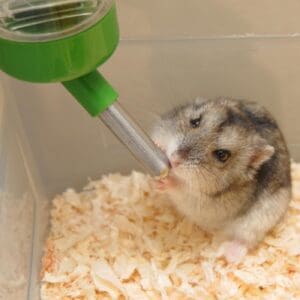
Besides providing freshwater and feeding them fruits with high water content will help maintain a long-term healthy appearance. You can seek further assistance from a veterinarian to rehydrate your hamster with salts and mineral supplements along with necessary fluids to restore it to good condition.
Read also : Why Is My Hamster Not Moving?
Old Age

Hamsters are excellent climbers and incredibly energetic creatures who enjoy exploring, playing, and moving around constantly in their habitat. Similarly to people, hamsters become physically weakened as they grow older. They will gradually lessen their traveling from place to place and would prefer to remain in the same spot
The average lifespan of a hamster is between two and three years. Relax if your hamster is showing signs of mobility issues at this point. It’s approaching retirement, so it prefers to rest and be alone most of the time. Sleeping patterns begin to change, with later wake-ups and earlier naps. A significant drop in energy is noticed during this period. It stops him from spinning on his exercise wheel or walking around the house. So take good care of your tiny mouse and make sure it is always happy and content.
Fear of Predators

Hamsters are quite cautious animals. They make an effort to remain still if anything terrifying occurs. It is scared of predators and loud noises, which make it uneasy. They would rather hide and avoid moving to a new place.

Some flee back to their cage, while others huddle in a corner or their preferred hiding place. However, a sudden response to such events is not continuous, so the owner need not keep a close eye on the hamster for too long. They immediately recover naturally and resume normal behavior.
Having newcomers or baby hamsters
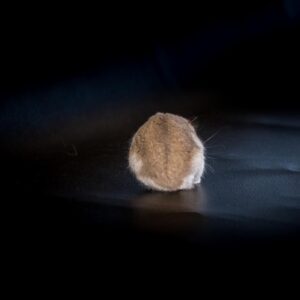
Generally, anybody takes several days to become familiar with the new surroundings. Likewise, a new hamster introduced into your home may initially exhibit weird and frightening behavior. The best tactic is to enable them to stay as they choose, creating a pleasant environment and fostering their trust. Some newcomers do not even move until they feel completely liberated and confident. They prefer to conceal themselves over the first few days and then slowly approach its premises.
Moreover, baby hamsters remain with their mother for three to four weeks before they can move on their own. This is why you often see pups tend to stay in the same area till they become adapted to their surroundings. To have a good relationship with the pet, we must appreciate the creature’s preferences and habits and allow it to live as it pleases.
On the final note, to ensure the health of your hamster, encourage it to engage in physical activity for 15 to 20 minutes each day. Make them climb horizontal bars or tubes, and play with wheels, balls, and blunt wooden toys. To prevent from becoming bored, make things better by communicating, sharing, and spending some time with them. This will instantly lead to a rise in both physiological well-being and emotional support.

Hello, my name is James and I’ve been caring for tiny pets for over 14 years with a passion. I enjoy passing on my expertise to other individuals in order for them to have the same amount of enjoyment as I do.

